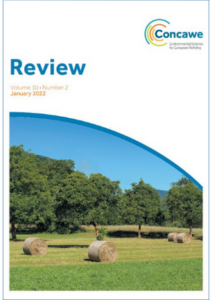Concawe Review 30.2
This Review adds some important articles to Concawe’s Low Carbon Pathways project, a programme started several years ago to develop a holistic view of how the refining industry could contribute to Europe’s decarbonisation objectives. Concawe believes that the refining industry could contribute to reducing transport’s greenhouse gas (GHG) emissions, in addition to the reductions achievable through the use of electrification and hydrogen, by supplying low-carbon liquid fuels (LCFs), e.g. sustainable biofuels and e-fuels, which could decrease emissions from the existing passenger car fleet as well as from the hard-to-decarbonise heavy-duty road transport, aviation and maritime transport sectors. It is important to understand the availability of biofuels based on the potential development of sustainable biomass, as sustainable biofuels could bring an important contribution to the decarbonisation of transport.
The first article summarises a study that Concawe contracted to Imperial College London Consultants, which evaluates the potential availability of sustainable biomass in Europe, and the consequent potential production of biofuels after deduction of the biomass that would be required for other non-energy and energy uses.
The second article summarises a study that Concawe performed to evaluate the theoretical potential, from now up to 2050, for the production of LCFs within the EU refining system, in terms of total volumes, the number of potential plants required, the contribution to GHG emission reductions in transport (following a well-to-wheels approach) and the level of investment needed for the transformation of the refining industry. The third article refers to an important study conducted by a research consortium composed of IFPEN, Sintef and Deloitte at the request of Concawe and other stakeholders (associations and companies active in the low-carbon and renewable hydrogen value chains). The study is based on unique and extensive energy and transport modelling, and delivers a comprehensive analysis of the dynamics of the European energy transition and of the contribution of renewable and low-carbon hydrogen to European climate objectives.
The fourth article explores how blends of gasoline, diesel fuel and ethanol (‘dieseline’), which have shown promise in engine studies examining low-temperature combustion using compression ignition, could be used without developing a flammable atmosphere in the headspace above the liquid in a vehicle fuel tank. A mathematical model designed to predict the flammability of dieseline blends, including those containing ethanol, was developed and validated experimentally, and used to study the flammability of a wide variety of dieseline blends parametrically.
Jean-Marc Sohier
Concawe Director
